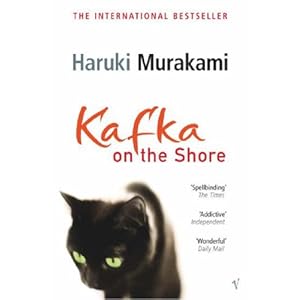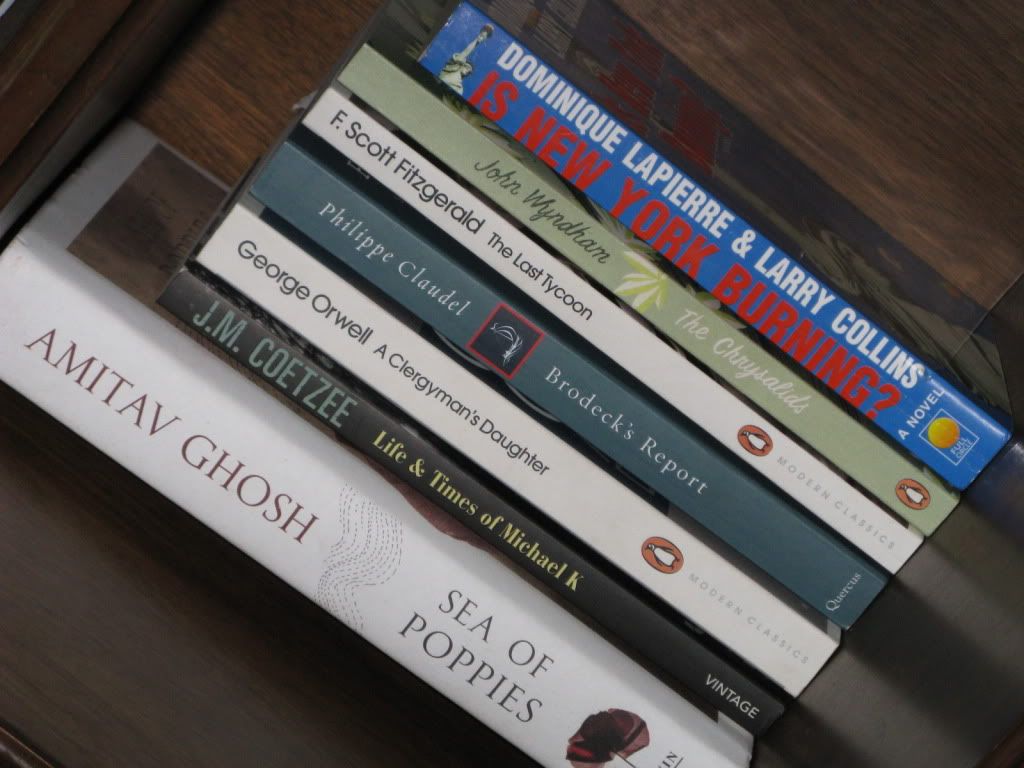I love libraries. I came home for a break, which was supposed to be just a week long. However, ended up falling ill, and it's now been over five weeks, and I'm still here. And, it's probably going to be a couple of weeks more. Sucks to be me, at the moment. But - enough of that. I essentially wanted light "frivolous" reading, while trying to recuperate (notice the word "trying"?), but the books I'd dragged along with me were more or less not. So, I visited the local library - a place I haven't visited for about nine years. I barely read in my last two years of school (don't ask - it's one of the few regrets I have), and then I went away to university, and wasn't ever home long enough to visit the library.
The age-old librarian still recognised me, and asked me how I was doing. Reminded me of how oft' I used to hang out at the library, just reading for ages, without a care for anything else. However, he said I'd have to re-apply for the library cards, which would take a couple of days to re-issue. I was well gutted, as I really don't want to buy books at the moment. Something to do with not really knowing what I feel like reading. Anyway, I took a long shot, and asked him if my library cards were still at the library, as I normally used to leave them there back in the day... Long shot indeed; it's been nine years! However, a pleasant surprise awaited me as the librarian managed to find four of the six cards I used to have. Yay!
So, I went a-book-searchin', and I was quite pleased with the books I took home, specially as I stumbled upon Peyton Place by sheer chance. I was looking at books by Daphne Du Maurier, and it was just there! I'd heard of Peyton Place ages ago, when I first heard Billy Joel's We Didn't Start The Fire. However, I had absolutely no idea what it referred to, until a few weeks back, when suddenly, I saw the name of the book practically everywhere in the blog'o'sphere.
The other books I checked out included Colleen McCullough's Angel, Adam Foulds' The Quickening Maze and Daphne Du Maurier's The Glass Blowers.
Friends have also recommended I read Vernon God Little and Northanger Abbey (along with Agatha Christie and PG Wodehouse). I'm not really in the mood for Wodehouse right now though. Do you guys have any other recommendations? I'm averaging about a book a day at the moment, and have very little else to do (well, I have been watching Prison Break), so all recommendations would be extremely welcome.
 Surrealism. I've reached the conclusion that it's the only word that can be used to describe Murakami's books. Kafka on the Shore is no exception. Leeches and fish rain down, there's a character called Johnnie Walker, and another called Colonel Saunders (of Kentucky Fried Chicken fame), a mysterious childhood "accident" results in one of the characters being able to speak to cats, and there's a portal to a parallel universe.
The book follows two characters in interleaving chapters: Fifteen year old runaway, Kafka Tamura and Nakata, an elderly man who is considered "dumb" by most as he is unable to read or write. While neither of them are aware of the other's existence, there's a greater (almost supernatural) force that connects them.
Surrealism. I've reached the conclusion that it's the only word that can be used to describe Murakami's books. Kafka on the Shore is no exception. Leeches and fish rain down, there's a character called Johnnie Walker, and another called Colonel Saunders (of Kentucky Fried Chicken fame), a mysterious childhood "accident" results in one of the characters being able to speak to cats, and there's a portal to a parallel universe.
The book follows two characters in interleaving chapters: Fifteen year old runaway, Kafka Tamura and Nakata, an elderly man who is considered "dumb" by most as he is unable to read or write. While neither of them are aware of the other's existence, there's a greater (almost supernatural) force that connects them. Note: Kafka on the Shore is the first Murakami I ever had on my shelf. It was given to me as a present sometime in 2008, and I kept "saving it" for the right occasion. I planned on reading it when I went on
Note: Kafka on the Shore is the first Murakami I ever had on my shelf. It was given to me as a present sometime in 2008, and I kept "saving it" for the right occasion. I planned on reading it when I went on 
 Ludo, born in the favela of Heliopolis (a shantytown), is "lucky." He's escaped a life of squalor, on being formally adopted by the extremely rich Carnicelli family, who have also hired his mother as a cook in their farmhouse.
Ludo, born in the favela of Heliopolis (a shantytown), is "lucky." He's escaped a life of squalor, on being formally adopted by the extremely rich Carnicelli family, who have also hired his mother as a cook in their farmhouse.

 There's a thin line between reality and fiction; they oft' reflect each other very closely, so much so that the line is indiscernible. But - what happens when reality starts imitating fiction?
That's the basic premise of Spark's 1981 novel, starring Fleur Talbot: an aspiring writer in London in the 1950s. She's writing her first novel, Warrender Chase, but she needs a job to get by while she finishes it. And so, she takes up the position of the secretary to Sir Quentin Oliver, and his brainchild: The Autobiographical Association.
There's a thin line between reality and fiction; they oft' reflect each other very closely, so much so that the line is indiscernible. But - what happens when reality starts imitating fiction?
That's the basic premise of Spark's 1981 novel, starring Fleur Talbot: an aspiring writer in London in the 1950s. She's writing her first novel, Warrender Chase, but she needs a job to get by while she finishes it. And so, she takes up the position of the secretary to Sir Quentin Oliver, and his brainchild: The Autobiographical Association. In a world where twenty-seven year old women are called "spinsters" and they aren't allowed to study further, despite being inclined towards academia, where they still need their mother's permission to carry out certain activities, and where they're bound by society's rules and regulations, this story is about a woman desperately trying to find her place and her footing while her siblings are getting married, having babies and moving ahead.
It's also a story about another woman, a spiritualist, who has been imprisoned due to her involvement in an affair which led to the unfortunate demise of one of her clients. She blames it on the spirits who she interacts with, but there isn't any evidence in her favour.
In a world where twenty-seven year old women are called "spinsters" and they aren't allowed to study further, despite being inclined towards academia, where they still need their mother's permission to carry out certain activities, and where they're bound by society's rules and regulations, this story is about a woman desperately trying to find her place and her footing while her siblings are getting married, having babies and moving ahead.
It's also a story about another woman, a spiritualist, who has been imprisoned due to her involvement in an affair which led to the unfortunate demise of one of her clients. She blames it on the spirits who she interacts with, but there isn't any evidence in her favour. A Gate At The Stairs is one of "those" books - beautiful writing, intelligent conversation flowing through the book, a sensitive plot, and a book with great potential.
Tassie is a college student in the Mid-western town of Troy, who finds a job as a baby sitter for Sarah, an affluent restaurant-owner who adopts Emmie, a "biracial" child. Sarah is perpetually busy running the upmarket restaurant, and Tassie ends up spending a fair bit of time mothering Emmie.
A Gate At The Stairs is one of "those" books - beautiful writing, intelligent conversation flowing through the book, a sensitive plot, and a book with great potential.
Tassie is a college student in the Mid-western town of Troy, who finds a job as a baby sitter for Sarah, an affluent restaurant-owner who adopts Emmie, a "biracial" child. Sarah is perpetually busy running the upmarket restaurant, and Tassie ends up spending a fair bit of time mothering Emmie. "Charming" - That's the first word that came to mind when I turned over the last page of this novella. I haven't seen the Audrey Hepburn movie, so I didn't really know much about the plot (maybe I really do live in my own little cocoon) prior to reading the classic.
There's Holly Golightly, who gets the star billing, as the writer recounts memories of his glamourous neighbour many years later. Holly Golightly is a young woman, drifting through life in New York in the 1940s: the bars, the martinis, parties, the social scene. A complex character, who's a wonderful combination of being naive and stubbornly independent, she keeps her friends close yet at a distance.
"Charming" - That's the first word that came to mind when I turned over the last page of this novella. I haven't seen the Audrey Hepburn movie, so I didn't really know much about the plot (maybe I really do live in my own little cocoon) prior to reading the classic.
There's Holly Golightly, who gets the star billing, as the writer recounts memories of his glamourous neighbour many years later. Holly Golightly is a young woman, drifting through life in New York in the 1940s: the bars, the martinis, parties, the social scene. A complex character, who's a wonderful combination of being naive and stubbornly independent, she keeps her friends close yet at a distance. In terms of books being confusing and complex, this one ranks right up there. New characters being introduced every couple of pages, the story taking dramatic turns, changing from showing corruption while trading in the 18th-19th century to a surreal adventure story, and there's a love story thrown in, just for good measure as well.
But no - that's not all. In fact, that's simplifying it much.
In terms of books being confusing and complex, this one ranks right up there. New characters being introduced every couple of pages, the story taking dramatic turns, changing from showing corruption while trading in the 18th-19th century to a surreal adventure story, and there's a love story thrown in, just for good measure as well.
But no - that's not all. In fact, that's simplifying it much. This is the third and final book of the
This is the third and final book of the  I bought this book back in January, simply because the blurb likened it to
I bought this book back in January, simply because the blurb likened it to 